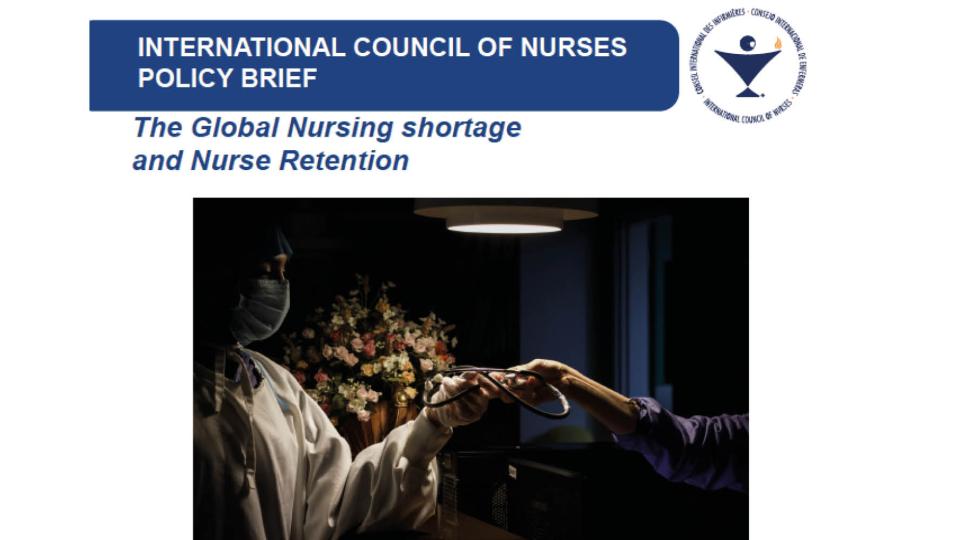COVID-19 pandemic one year on: ICN warns of exodus of experienced nurses compounding current shortages

Geneva, Switzerland, 11 March 2021 – The pandemic has put nurses under enormous pressure and there has been a huge increase in the number intending to leave the profession. But even if governments invest in training more new nurses now, it will take at least three years for them to become registered nurses, and they will be novices who will need time to be able to step into the shoes of their more experienced colleagues who are leaving right now.
A year on since the World Health Organization (WHO) declared COVID-19 a global pandemic, a new International Council of Nurses (ICN) survey reveals that nearly one in five of its National Nursing Associations (NNAs) surveyed report an increase in the number of nurses leaving the profession. 90% of them are ‘somewhat or extremely concerned’ that heavy workloads, insufficient resources, burn-out and stress are the factors that are driving that exodus. WHO has confirmed the mass trauma of healthcare workers, highlighted by ICN in January.
The world entered the pandemic with a shortfall of up to six million nurses and an additional four million expected to retire by 2030, which puts the global nursing workforce under an intolerable strain. ICN says large numbers of experienced nurses are leaving the profession or considering calling time after the pandemic, which should be a wake-up call for governments to invest in nursing jobs, education, and leadership before it is too late.
Healthcare systems were shown to be woefully unprepared for such a global emergency, with many countries lacking sufficient intensive care beds, ventilators and other technology, and a worldwide shortage of personal protective equipment.
Many nurses contracted the virus and ICN is aware of 3,000 nurse deaths related to COVID-19 but believes that is a gross underestimate due to a serious lack of data, an issue first raised by ICN a year ago.
ICN President Annette Kennedy said:
“I am deeply concerned about the state of the nursing profession, the mental and physical trauma nurses have endured over the past year and the many who may suffer post traumatic stress. ‘The strain that nurses are under is unacceptable, and it is no surprise that so many are feeling the pressure and deciding that they can no longer continue in the jobs they love. When dedicated and experienced nurses call time on their profession, it is a clear indication that something is seriously wrong. Nurses cannot be expected to continue if they are overworked and under-valued. Our nurses have gone way beyond the call of duty this past year: governments must now repay their dedication and commitment with the support nurses need to carry on their vital work for the patients, families and communities that they serve so well.”
ICN Chief Executive Officer Howard Catton said the new data shows that difficulty in retaining experienced senior nursing staff, an effect of the pandemic that was expected to occur in the long term, is happening right now.
Mr Catton said:
“This unwelcome anniversary should be a line in the sand that marks a fundamental change in how healthcare services are funded and organised. One year on, the nursing workforce is looking over a precipice: the COVID Effect on nursing is real, it’s an imminent threat to the security and strength of our healthcare systems, and it might get even worse.
‘ICN has been reporting on what has been happening with the global nursing workforce over the past year, and we have seen how the COVID Effect has severely damaged our nurses’ physical and mental health. ICN has called it a mass trauma and WHO Director General Dr Tedros has confirmed it as such.
‘Now we are seeing a perfect storm caused by the mismatch between increasing healthcare needs and the supply of experienced nursing staff. Add in the pent-up demand from untreated non-COVID conditions, and the fact that it takes three or four years to make a novice registered nurse, and the outlook is bleak.
‘The COVID Effect on the global nursing workforce, coupled with the current shortage of six million nurses and a further four million heading for retirement by 2030, could see the global nursing workforce of 27 million nurses being depleted by ten million, or even halved. With growing healthcare demands waiting in the wings, we cannot allow the number of experienced nurses to continue to dwindle. We are hearing of governments’ good intentions to recruit new nurses for the future, but it takes three or four years to train them, and many more years to build up the experience necessary to become nursing leaders and experts. Hence the urgent need to support and retain our current workforce.
‘Retaining our most experienced nurses will require bold actions from governments, including making improvements to pay and working conditions, enabling older nurses in particular to have flexible working arrangements, and providing appropriate mental health support to help them deal with the traumas of the past year.
‘We have pushed world’s nursing workforce to close to breaking point throughout this pandemic. We still have a chance to protect them, but time is short: we are at one minute to midnight and the clock is ticking.”
Read the report here
Download the press release here